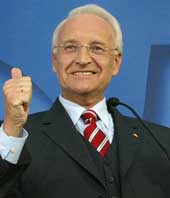 |
| Edmund Stoiber (left) and Gerhard Schroeder. (Reuters) |
Berlin, Sept. 22 (Reuters): Germany’s election outcome was too close to call an hour after polls closed on Sunday as television projections gave conflicting figures in one of the closest races in post-war history.
Forecasts based on early results were so close that it was unclear which main camp, Chancellor Gerhard Schroeder’s ruling centre-Left Social Democrats and environmentalist Greens or Edmund Stoiber’s possible conservative-liberal alliance, would be able to secure enough of a majority to govern.
The election outcome is crucial for the world’s lumbering number three economy and could have significant consequences for its role in a possible war in Iraq and the future of its strained relations with the US.
However, fears of a hung parliament receded as the successors to former East Germany’s ruling communist party looked set to drop out of parliament.
A projection for ARD television indicated that Schroeder’s coalition was headed for a tiny majority in parliament over a conservative-liberal alliance.
The latest projection, based on early counts, gave Schroeder’s SPD 38.1 per cent and the Greens 8.6 per cent, 38.8 percent for Edmund Stoiber’s conservatives and 7.3 per cent for their traditional partners, the liberal Free Democrats.
ARD said its calculations indicated this would give the current SPD/Greens coalition a one-seat parliamentary majority.
ARD’s previous projection had put the conservative-liberal alliance in a slim lead. However, separate projections for ZDF television showed the two possible coalitions level in terms of seats in parliament. The provisional official result was not due out until after 2200 GMT.
Most forecasts showed Schroeder’s SPD suffering losses of over three points compared with the last election in 1998.
It stood at less than 38 per cent, with the conservatives advancing around four points to just under 40 per cent and looking set to become the largest party in parliament.
The Greens looked set to gain more than two points to over nine per cent while the FDP was up one point to just over seven per cent.
The reformed communist Party of Democratic Socialism was projected to fall below the threshold needed to enter parliament, diminishing fears among all the main parties that it would prevent either of them forming a clear majority.
Stoiber said he expected a clear majority to emerge for his camp as results came in. “We are by far the biggest party,” he told cheering party faithful in Berlin.
Voters faced the dilemma of liking the charismatic Schroeder personally while feeling dissatisfied that his SPD failed to make much impact on spiralling unemployment.
Schroeder’s conservative challenger, the austere Bavarian state premier Edmund Stoiber, is far less popular personally, but opinion polls indicated his party was seen as a more capable manager of the economy. Schroeder’s opposition to a US-led attack on in Iraq dominated the final days of campaigning.
Along with his deft handling of the floods that devastated parts of Germany last month, it helped his party overtake the conservatives in the space of a few weeks after trailing in opinion polls all year. However, the strategy, which has distracted attention from unemployment, has strained relations with the US.
The US was enraged by reports that Schroeder’s justice minister, Herta Daeubler-Gmelin, had likened President George W. Bush’s stance on Iraq to Hitler’s use of foreign policy to hide domestic woes. She denied having made the remarks.
Stoiber was the first of the chancellor candidates to vote, arriving in blazer and red-and-white striped tie and accompanied by his wife in his hometown Wolfratshausen, south of Munich.
Schroeder arrived some hours later at a polling booth in Hanover, also with his wife and similar-coloured tie.
Amid rain in the German capital, a mixture of mostly pensioners and joggers were the first into polling stations.
“It's been a very interesting campaign with real clashes between the parties. I think turnout will be very high. This is a vital area for the PDS and I think they could do it,” said saleswoman Karin Vahl, 53, in one marginal Berlin district.
Interest has been fuelled by unprecedented TV debates in a campaign that has focused heavily on the personalities.
Neither candidate has dared risk losing votes by pledging painful welfare and health care cutbacks economists see as vital to stop Germany becoming as chronically stagnant as Japan.
The promises have been surprisingly similar, focusing on modest labour market reforms. Both oppose turning Germany into a US style “hire and fire” economy.
Stoiber, who would be the first Bavarian ever to be elected chancellor if he wins, has pointed to his record of managing his wealthy southern state, where unemployment is just over half the national average of about 10 per cent. He has highlighted Schroeder’s failure to honour a pledge to cut unemployment to below 3.5 million.










